Discipline Reset
How to establish healthy, biblical discipline after a season of disorder.
Contents
The Situation
In our household we have hit the reset button on discipline multiple times. Each time it’s been necessary, each time it’s been my fault, and each time we have been blessed and grown as a family. I offer here some biblical principles for discipline and our own approach to implimenting a discipline reset in light of them. Sometimes (in what follows) I am exhorting faithfulness to biblical commands, and sometimes I am commending my household’s application of biblical commands. The former, as long as I have rightly understood the Bible, are for all to embrace and obey. The latter are for you to consider and apply to the degree that they fit your family and your needs. I’m writing this particularly for the person who realizes they need a reset but doesn’t know what to do next.
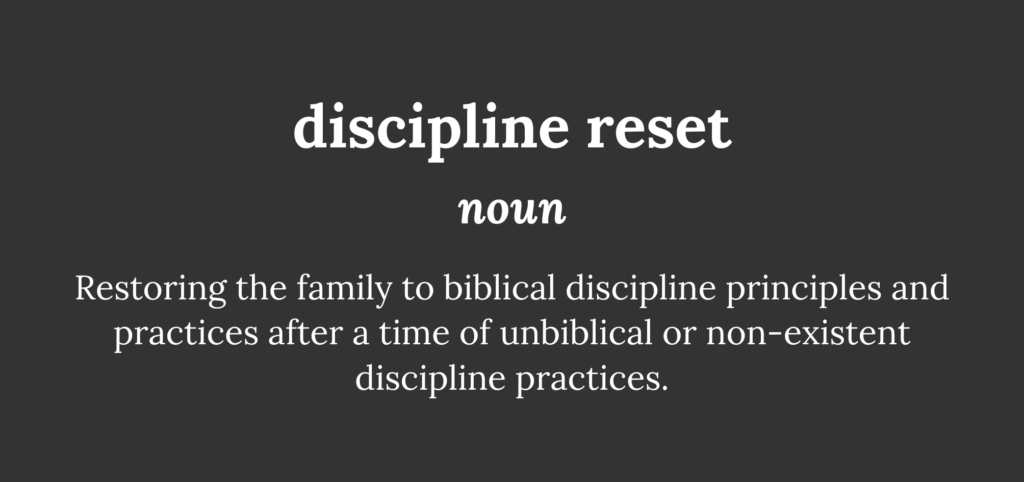
There are two preliminary things we should consider before we jump in. The first is the signs that a reset is needed. Learning to detect these is important not only to determine a reset is needed this week (perhaps), but also to avoid the need for a reset again in six weeks. It is also good to reflect on these signs because they may be the external results of faulty thinking parenting and discipline. The signs are often symptoms of deeper issues. We need to address the deeper causes for our discipline reset to work. To keep us to time I’ll list them.
1. If there is tension between you and your spouse regarding how you think about discipline (the theory) or how you want to apply discipline (the practice), a reset is in order. You need to be a team for discipline to be consistent, fruitful, and even happy, in your home. This one will require a reset between mum and dad before you go to the kids.
2. If your children are not obeying your instructions, a reset is in order. Obedience is a fundamental biblical reality children need to learn and embrace in order to grow into wise and godly adults. In addition to that, obedience is a major mark of a healthy parent-child relationship. If your children are not obeying you they are not relating properly (biblically) to you, and, without a reset, you may end up relating improperly (unbiblically) to them. Obedience is critical.
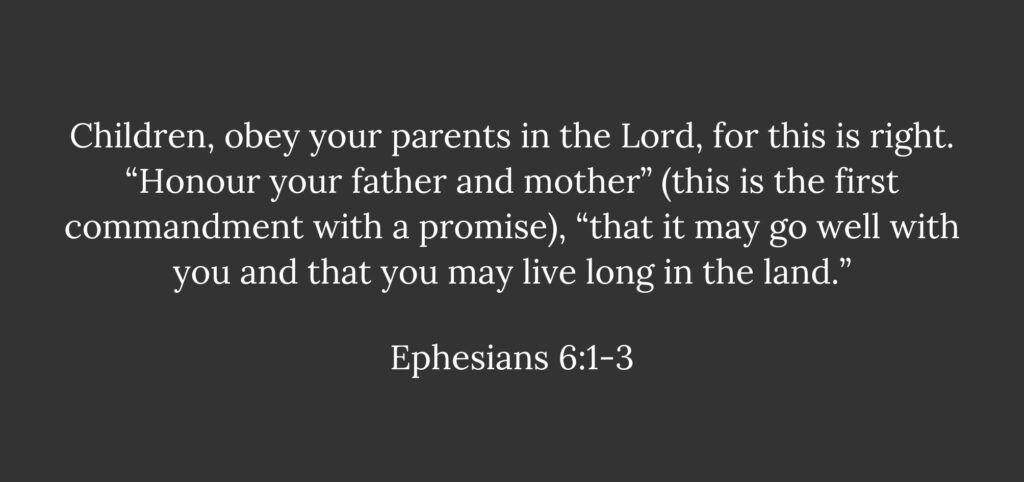
3. If order in the family is being maintained by negotiations, threats, and rewards, a reset is needed. I have had many conversations with our children which were essentially negotiations. My instructions were met with questions, challenges, or requests for deferral, and I responded with reasons and persuasion. This taught my children how to train me, and led me into frustration and exhaustion. Threats and rewards are attractive because they can achieve quick results. But they are also superficial results that don’t express deeper character formation. The one thing threats and rewards do ensure is their ongoing use.
4. If discipline is being done emotionally or driven by emotion (particularly anger), a reset is in order. Similarly, discipline may have become a “last resort.” But if this is the case, it is no longer biblical discipline. And what have we been doing until “enough is enough”? Probably negotiations, threats, distractions. Biblical discipline belongs at the front end of the process not the back end, when emotions are under control.
5. If you often feel unsure about discipline, a reset is probably in order. This may be the result of ambiguity in the family about discipline. You might not have thought through what discipline is, why it is necessary, or when it is necessary. There is a lot of potential uncertainty here. We need clarity of thought and a plan of action. Like number 1. this one needs a ‘mum and dad reset’ first.
There aren’t the only signs. But if you’re seeing these in a pronounced way, it’s time for a reset. Now, on to implementing a discipline reset.
Dad, Call a Family Meeting
I was a little unsure of myself the first time I did this, but I was surprised by the power of Dad calling a family meeting. There’s power here because when Dad does this sort of thing he leans into his nature as a husband and father (into the husbandness and fatherness God put in him as a man). When Dad calls a family meeting he lets everyone know that he knows he’s been given authority over this household by God (1 Cor 11:3; Eph 5:23, 28), and that he’s willing to exercise the responsibility that comes with that authority. He is uniquely responsible to love, lead, and protect the family. We didn’t understand why the first time, we just knew something significant and good was happening when I called a family meeting.

The dinner table is the central place of family business in our home. So this is where I called us to for our first discipline reset: “Everyone, come and join Dada at the table, please. We’re going to have a family meeting!” Wherever you call your family to, it’s good to make this obvious and explicit. If there’s been disorder in the home you have probably already tried subtle tweaks and quick fixes. It’s time to call “time,” and directly address what’s happening.
Explain the Recent Disorder and Confess Your Sins
It is hard to overstate how significant it is for our children to hear and see us repent of sins we’ve committed against them. We may have latent pride in our hearts that is shaping our parenting, such that apologising and seeking forgiveness from our children seems embarressing, or even repugnant. If we feel this way we need to repent. We may have learned from someone somewhere that apologising to our children will compromise our authority over them, or that they will no longer respect us if we admit we were wrong. We need to repent of this as well, as a way of thinking.
Parental authority is not something we earn from God. It’s something He has written into the parent-child relationship. Our job is to steward and use it wisely. And think about your own experience. Have you ever lost respect for someone who admitted they were wrong? This is not how it works, and especially not within a biblical worldview, where it’s understood that Mamas and Dadas sin just as sons and daughters do, and all need the grace of God.
If obedience is fundamental to being a growing child, then responsibility is fundamental to being a growing parent. This may not be obvious at first, but if there’s disorder in our household, we have almost certainly been falling short in our parenting. We are responsible for all that goes on under our roof. But in a more specific way, the disorder in the family (disobedience, unloving behaviour toward siblings, greed, jealousy, grumbling, temper tantrums) is a result of our parenting. It might be disengaged, distracted, or absent (outsourced) parenting, in which case the children have not been given loving boundaries and consistently kept within them. It might be harsh and overbearing parenting, in which case the children are criticised frequently, and are exasperated into rebellion. The point is: if there’s disorder in the household, we almost certainly have some confessing and explaining to do.

In our household, a major sin of mine has been abdication. My flesh inclines me to abdicate my responsibilities to lovingly and consistently discipline the children. In this, I have let the family down and allowed the children to pursue foolish patterns of behaviour and sin. I have abdicated in multiple ways. Self-pity. ‘I’m not seeing fruit for my parenting labours, how sad for me, I think I’ll crawl into a hole and let the house fall down.’ Distraction. ‘I’ve got so much to do, and what I’m doing is very important, it’s meaningful to me and it helps others, who then think well of me, which is also nice… What did you say, hun? Liam is hitting Lewis with what? I can’t hear you over my podcast (probably on parenting.)’ Laziness. Parenting is hard and there’s no godly way around it. There are plenty of ungoldy ways around it. In my laziness I have overlooked the tones in our home, the minor facial reactions which over time grow into major rudeness and disrepect. I have let sin creep into our home until all the relationships are strained and disorder is the general state of affairs.
Dad, do what Adam failed to do and take responsibility for the state of your household. Acknowledge where you have fallen short and explain how it has impacted the family. Say sorry to God first, Mum second, and the children third. We know the phrase, “The buck [responsibility] stops here [with dad].” This is true. It is also true that the trouble starts here: with Dad. It will unburden the children to hear that you have sinned as well. It will steady your wife to see you answer God’s Edenic questioning rightly. Not by saying: ‘The woman,’ or ‘the children you gave to be with me…’ (Gen 3:11-12). Set a standard for the family to see and follow: take repsonsibility, confess your sins, repent and trust Christ.
Remind the Family What God Says About Discipline
When we started a family we knew we would discipline our children. But we had not thought deeply about biblical discipline. Neither had we thought carefully about what it would require of us. It is hard work. But it is good work and God calls parents to it. In a discipline reset meeting the family needs to be reminded that discipline is God’s good idea for driving foolishness from our hearts and training us in wisdom and righteousness. As God puts it in Proverbs: “Folly is bound up in the heart of a child, but the rod of discipline drives it far from him” (Prov 22:15).
It will help to have a definiton of discipline to repeat often until the family knows and remembers what discipline is. Ambiguity is a great hindrance wherever it is found and parenting is no exception. Our family definition is: “Tapping on the bum for training in the heart.” An extended definition might be: “A short term pain imposed in love to correct sinful behaviour and cultivate wisdom.”
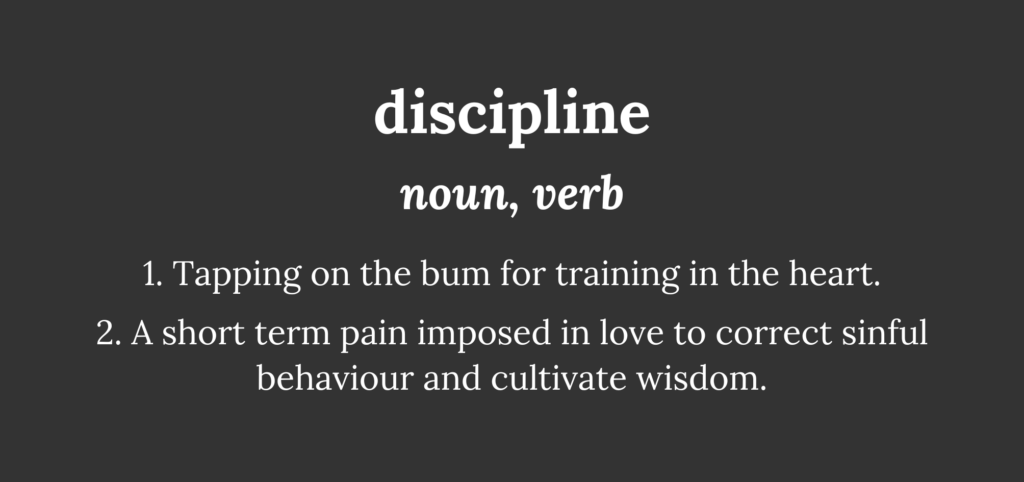
In our first discipline reset meeting, I used the framework from Tedd Tripp’s
Shepherding a Child’s Heart. My explanation went roughly like this: ‘God commands children to obey their Mama and Dada, and this is wise and good. When you obey Mama and Dada (as we obey God) you are living in “the circle of safety.” This is where there is life, blessing, and peace (Eph 6:1-3; Col 3:20). This is where God wants you to be and so do Mama and Dada. Disobedience takes you outside the circle of safety. There’s danger outside the circle (Prov 5:23). This is where sin increases, hearts are hardened, and repentance becomes more and more difficult (Heb 12:15-17). God doesn’t want you to live out here, and neither do Mama and Dada. This is why God has given us discipline. Discipline brings you back into the circle of safety. Mama and Dada will discipline you because we love you, and discipline will keep you safe – in fellowship with Mama and Dada, and walking wisely before God.’
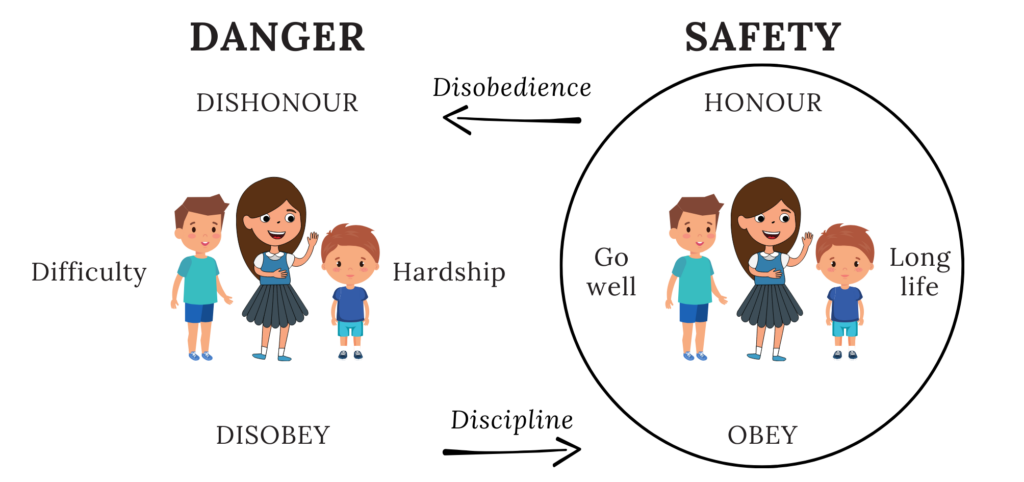
My diagram of Tripp’s framework. We would talk through the process, referring to the diagram, in the days following a reset. I’m not a graphic designer, but it helped.
The goal here is to re-establish an understanding of discipline and its role in the family. There’s plenty to say, and a single discipline reset meeting can’t cover everything. We can begin with the important building blocks. (1) Discipline is an expression of love (Prov 13:24; 19:18). God disciplines those he loves (Heb 12:6). The father who delights in his son disciplines him (Prov 3:11-12). If the children hear nothing else from us in a discipline reset let it be this: ‘Mama and Dada are going to discipline you, not because we don’t love you, but because we do.’
If discipline is an expression of love, then of course, (2) discipline is good. It will be painful for a short time, but this doesn’t mean it is bad (Heb 12:11). Not everything that is painful (or difficult) is bad for us. This might take some explaining and some experience, but it’s worth cultivating in our families because the principle applies to all of life for Christians (Rom 5:3-4).
(3) Discipline is corrective, not retributive or vengeful (Prov 10:17; 12:1, NIV). This means Mama and Dada won’t be angry when they discipline. The kids will probably be upset and fearful of the pain of a smack. But they are safe with Mama and Dada, even when they are being disciplined. The moments directly following discipline go a long in communicating this.
Depending on the attention spans around the table one more might be useful. (4) Discipline trains (Heb 12:11). This is a reminder that discipline is not going to be a random event that surprises the children and is not heard of again until the next incident. It will be integrated into family life and reflected upon in peacetime. I asked my older son recently to reflect on some unwise behaviour he had engaged in (What was he pursuing? What was going on in his heart? What did the behaviour bring about?). He told me the following day that he had done so. He then said, “You’ve never told me to do that before, Dada.” What a blindspot. Thank you, my son.
After our children receive discipline I quote them the words of Hebrews 12:11 and I allow them to finish the verse: “[discipline] produces a harvest of righteousness and peace… for those who are trained by it.” Then I exhort them: “Are you going to be one who is trained by discipline, my son?” “Yes, Dada.” “Let’s be trained by discipline, sweetheart, OK?” “OK, Dada.” And off we go. Much could be said about this, so discerning how much your family can digest in the initial meeting will be important.
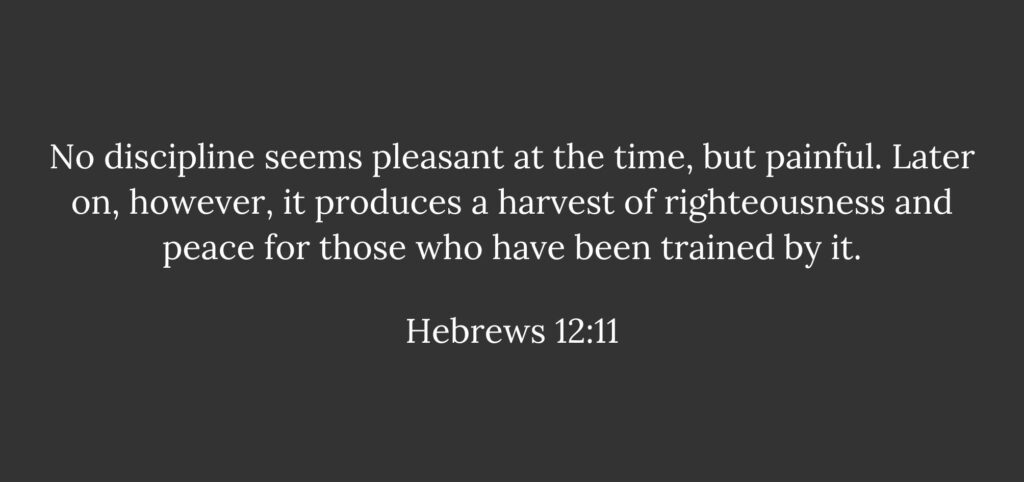
Prepare Everyone for the Changes
One of the major ways we can love our kids in this meeting is by giving them clarity and predictability. It will be good to discuss what will receive discipline. Be as specific as possible. In our household any obvious disobedience or disrespect incurs discipline (2 Sam 7:14; Prov 29:16-18; Psa 39:11). Obvious disbedience is usually an active response to an instruction or prohibition. You may want to mention specifically the instructions and prohibitions that have been disobeyed in recent family memory (if you name names, where there are multiple children present, this can be fun and even lighten the mood – our children know each other’s unique inclinations to sin and have fun reminding each other. We have a hitter, a face puller, and a grumbler.)
“Any obvious disobedience” may seem overly strict at first, but our heavenly Father doesn’t permit disobedience of any sort in us. He disciplines our rebellion and calls us to repent. Why should should we permit disobedience in our children? We should keep in mind that we are never not training our children. What I mean is that allowing our children to disobey without any consequences is training them to disobey. Remember, folly is bound up in the heart of a child (Prov 22:15) and it’s always looking for an opportunity to stretch its legs. If we omit discipline we permit disobedience.
As for disrespect, this has to do with tone of voice, choice of words, or facial responses. These are often distinct from disobedience and more about expressions of sinful attitudes towards parents. We are to raise our children to “Honour [their] father and mother” (Ex 20:12; Eph 6:2), so disrespect incurs discipline. As above, giving concrete examples of this to the children is loving. There should be no surprises when discipline comes on account of disobedience or disrespect because you have told them what these look like in your family (they have seen have seen them before!). It also helps the children to grow because they know exactly what it is they need to repent of.
An explanation of the actual discipline process is another way of lovingly preparing the family for the days and weeks that follow a reset. We want to minimise uncertainty and the fear. Each family’s process may differ in these particulars, but as an example, our process looks like this.

1. I, often in conversation with Mama, identify the disobedience or disrepsect and (only if/when calm) call my child to a private part of the house (private in order to prevent shaming).
2. I lead my child in admission of the sin in order that the discipline can be received. For discipline to train it is good for children to understand before, as well as after, that discipline is warranted. (Usually a defense or explanation is not needed – I saw him hit the other child! But in the cases where I am unclear, I ask for an explanation.)
3. I deliver some smacks – numerous and hard enough to make this whole situation one my child does not want to be in again, but never to do harm. Biblical discipline should distinguish carefully between causing short-term pain (on a bottom designed to absord a smack) and causing physical harm.
We have found that between the ages of two to six, three to five smacks per discipline is sufficient. It’s important to note here that if done properly and consistently there need only be a few days of smacks to bring the behaviour back within godly boundaries. It is not the hope that smacking would be happening frequently and for a prolonged period of time. If this does happen it may mean boundaries are not clear, or the initial disciplines are not given with the necessary sting. One of our children once celebrated to me that he had received smacks when I was out. He was so happy to report it to me because “It didn’t even hurt, Dada!” We enjoyed the joke and learned the lesson. The idea here is to choose the short-term sharp pain of discipline rather than the long-term dull pain of settled sin and character decline. This is the very logic of discipline in the book of Proverbs.
4. Once the smacks are administered I cuddle and comfort my child until the sharpness of the pain is gone and the tears have stopped. This may seem counter-intuitive, but it is entirely fitting since biblical discipline is an expression of love and never an act of anger or retribution. This comfort is a powerful way of teaching the children the nature of biblical discipline.
5. Now it’s time to pray. In the early days I would lead the kids in prayer, helping them move through a healthy anatomy of confession. I would aim for us to seek forgiveness from God (which is richly and readily available in Christ), to acknowledge the sin specifically, and to ask God for repentence, faith, and heart change.
6. Finally, I say, “Fully forgiven and fully restored,” as I offer a final cuddle which transitions us out of the discipline process. The kids know these words are coming, and they know there is nothing more to be done. There is no penance required, neither do they need to win back my smiling face. I remind them of their discipline before the day ends, and usually the next day as well, to encourage them to be trained by their discipline.
Your process will need to fit your family. It’s OK to start small with the essentials and add in extra pieces as you discover you need them. In all of this clarity is kindness, so prepare the family well for the changes to come.
Pray
Praying thoroughly for the reset is a great way to emphasise once more that the family is being reoriented to God and His good ideas. It is not a new family trend we are trying, neither is it a result of Mama or Dada being “disciplinarian” by personality. It is a realignment to God’s wisdom for family and parenting and as such we will need God to help us from beginning to end. I recommend praying for each member of the family according to their challenges, roles, and responsibilities.

Dada will need God to help him stay the course even when it gets difficult, even if every member of the household is unhappy with him, even when he’s tired, even when he’s the one who needs to confess his sins and repent. Holding course day in and day out falls to Dada as the head of the house and this will not be easy. He will need much patience and gentleness. He will need to discern the hearts and minds his family and lead all in Spirit-given self-control. It won’t be easy, but God will strengthen him with grace and bless his faithfulness. Pray for Dada, and cheer him on!
Mama will need God to help her trust Dada’s judgement and submit to his decisions, especially when the stakes are high (in our experience submission – and leadership as well – is easier in the less consequential things). She will need gentleness and wisdom for when Dada makes mistakes. She is lovingly given to him for partnership and deliberation, but the flesh often provokes Mamas to seek to rule over Dadas (and Dadas to abdicate their authority and responsibility). Taking the posture of Sarah (1 Pet 3:4-6) will be critical for the health of the household, and God will equip Mama for this.
We need to pray for our children always. Growing up is not easy, and folly calls out to children as well as wisdom. Pray for the regular proclamation of the grace of God in the home to be seeping deeply into the hearts and minds of the children. Pray for softened hearts as they see more clearly their suffering Saviour. Pray for ever-increasing insight into the wisdom of God’s ways for the family, and God’s gift to them of parents who are raising them up “in the fear and admonition of the Lord.”
Be Consistent
Sometimes when I’m trying to make a change in life I use the formula: “Know the plan, trust the plan, stick to the plan.” From here on out it is all about sticking to the plan. Consistency is a kindness to our children just as clarity is. In fact, the two need each other. Confusion is sure to arise if we are inconsistent with discipline. If snappy, disrespectful speech receives discipline on Monday, it needs to receive discipline on Thursday as well. If a particular behaviour is recurring, discipling it on Monday and Tuesday but not on Wednesday will confuse the children. Not to mention the consistency helps to drive the behaviour out.

It isn’t easy to hold the line, but it blesses the family to do so. I’ve been surprised how much peace, joy, and affection have grown up in our family through consistent, biblical discipline. And this can often be seen right after discipline is applied. I also did not anticipate that “the smack” could be humours in family life. Our kids often threaten me with smacks, joke with each other about their own smacks, and brandish “the flipper” (our family’s silicon “rod”) at me and Mama when our behvaiour is not to their liking. I put all this down to our discipline being biblical and therefore a good and helpful thing in everyone’s minds.
This is a good place to address a possible concern. Outlining discipline in this way can lead us to expect that every day will be punctuated by smacks indefinitely. And this does not sound appealing. But this is not what we should exect of biblical discipline. If a discipline reset is done properly – clearly, firmly, and consistently – there should be visible fruit after a few days. This is because what God says about discipline is true. It really does drive folly out. It really does train and produce a harvest of righteousness and peace. Of course these are long-term projects. But the beginnings of these things can be seen a lot sooner you we might imagine. Biblical discipline works. And children learn wisdom when presented with clear and consistent consequences for foolishness. We should expect a few days (or a week) of regular trips to a private part of the house. But this shouldn’t be the norm beyond that if the discipline is clear, firm, and consistent.
Conclusion
I have been daunted each time we have needed to make a significant change to our family discipline. If you are similarly daunted I would be delighted if what I have shared is a help to you. If any of the practical application does not fit your family I hope you will find a better fit for the biblical principle, which is always true and good. And if you are largely in agreement, and in need of a reset, do remember the days come to us in 24 hour periods for a good reason. This is all we can manage before we need to lie down for a while! Keep praying, and keep plodding.